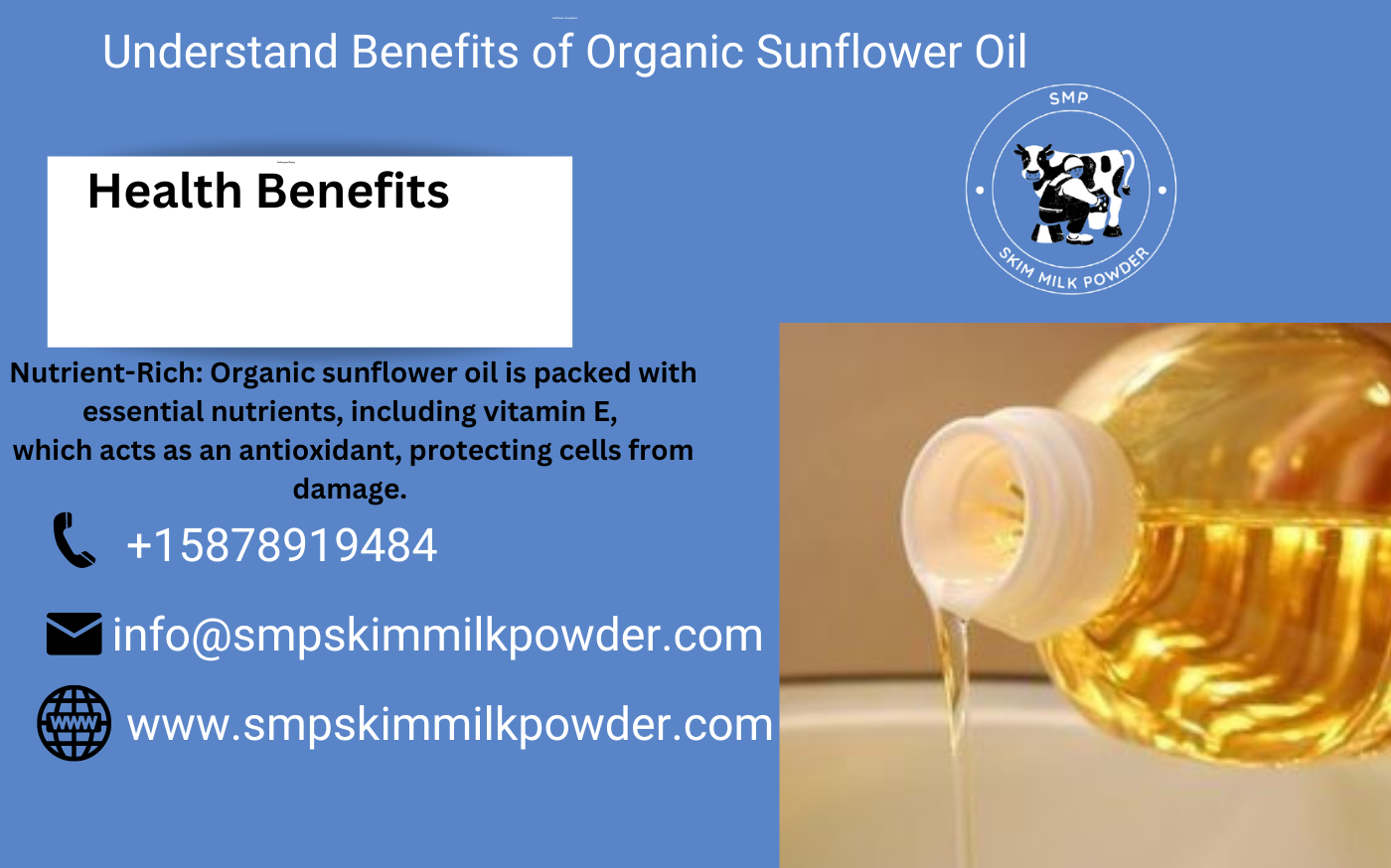Organic sunflower oil is a premium product that stands out for its health benefits, environmental sustainability, and purity. Extracted from organically grown sunflower seeds without the use of synthetic pesticides or fertilizers, organic sunflower oil is a popular choice for health-conscious consumers and those committed to environmentally friendly practices. Here’s an in-depth look at organic sunflower oil, including its benefits, production, uses, and tips for purchasing:
Benefits of Organic Sunflower Oil
- Health Benefits:
- Nutrient-Rich: Organic sunflower oil is packed with essential nutrients, including vitamin E, which acts as an antioxidant, protecting cells from damage.
- Healthy Fats: It contains high levels of unsaturated fats, particularly oleic and linoleic acids, which are beneficial for heart health.
- Free from Chemicals: Being free from synthetic pesticides and fertilizers, organic sunflower oil minimizes the risk of exposure to harmful chemicals and residues.
- Environmental Sustainability:
- Organic Farming Practices: Organic sunflower oil is produced using sustainable farming practices that enhance soil health, conserve water, and promote biodiversity.
- Reduced Environmental Impact: The absence of chemical inputs reduces pollution and environmental degradation, making organic farming more eco-friendly.
- Purity and Quality:
- Non-GMO: Organic sunflower oil is typically non-GMO, ensuring that the seeds are not genetically modified.
- Cold-Pressed Extraction: Often, organic sunflower oil is cold-pressed, preserving its nutritional quality and natural flavor by avoiding high-temperature processing.
Production of Organic Sunflower Oil
- Organic Cultivation:
- Seed Selection: Organic sunflower seeds are chosen for their quality and suitability for organic farming.
- Pesticide-Free: Farmers use natural methods to manage pests and diseases, such as crop rotation, beneficial insects, and organic-approved pesticides.
- Soil Health: Emphasis is placed on maintaining soil fertility through composting, green manure, and other organic amendments.
- Harvesting and Processing:
- Careful Harvesting: Sunflower seeds are harvested at their peak maturity to ensure optimal oil content and quality.
- Cold-Press Extraction: Seeds are mechanically pressed at low temperatures to extract the oil without the use of solvents or chemicals, preserving its nutritional integrity.
- Certification and Compliance:
- Organic Certification: Organic sunflower oil must meet stringent organic certification standards, such as those set by USDA Organic or EU Organic, ensuring adherence to organic farming and processing guidelines.
Uses of Organic Sunflower Oil
- Culinary Applications:
- Cooking and Frying: Its high smoke point makes it suitable for frying, sautéing, and baking, while its mild flavor complements a variety of dishes.
- Salad Dressings: Used in vinaigrettes and dressings for its light texture and health benefits.
- Baking: Ideal for use in baked goods, adding moisture without overpowering flavors.
- Cosmetic and Personal Care:
- Skincare: Widely used in lotions, creams, and balms for its moisturizing and antioxidant properties, helping to nourish and protect the skin.
- Haircare: Included in shampoos and conditioners to provide hydration and shine to hair.
- Health and Wellness:
- Dietary Supplements: Sometimes used in dietary supplements for its essential fatty acids and vitamin E content.
- Massage Oil: Its smooth texture and skin benefits make it a popular choice for massage oils.
Tips for Purchasing Organic Sunflower Oil
- Verify Certifications:
- Look for Labels: Ensure the product is certified organic by reputable organizations like USDA Organic, EU Organic, or other recognized bodies.
- Non-GMO Verification: Check for non-GMO labels to ensure the oil is free from genetically modified organisms.
- Check the Extraction Method:
- Cold-Pressed: Opt for cold-pressed organic sunflower oil, as this method preserves the oil’s nutritional and sensory qualities.
- Evaluate Packaging:
- Dark Bottles: Choose oils packaged in dark glass bottles to protect against light exposure, which can degrade the oil’s quality.
- Proper Sealing: Ensure the bottle is properly sealed to maintain freshness and prevent oxidation.
- Consider the Source:
- Reputable Brands: Purchase from reputable brands or suppliers known for their quality and transparency in sourcing and production.
- Origin Information: Some products provide information about the region where the sunflowers were grown, adding an extra layer of traceability and quality assurance.
Conclusion
Organic sunflower oil is a high-quality, healthful, and environmentally friendly option for both culinary and personal care uses. Its production adheres to rigorous organic farming and processing standards, ensuring a product that is free from harmful chemicals and rich in beneficial nutrients. By considering factors such as certification, extraction method, packaging, and source, consumers can make informed choices and enjoy the numerous benefits of organic sunflower oil. Whether for cooking, skincare, or overall wellness, organic sunflower oil offers a versatile and sustainable choice.

